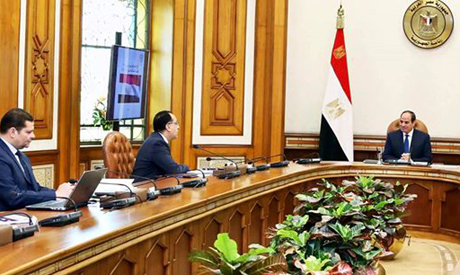
Egypt’s Sisi meets PM Madbouly and finance minister Maait (Photo courtesy of the Egyptian presidency spokesman official facebook page)
Egypt has said it might turn to “austerity measures” if the fallout from the coronavirus pandemic extends into the new fiscal year, which begins in July.
Presidential spokesman Bassam Rady said President Abdel-Fattah El-Sisi had held a meeting with Prime Minister Mostafa Madbouly and Finance Minister Mohamed Maait and finance ministry officials to follow up on financial performance indicators given the pandemic.
Maait said that the potential austerity measures include revising or removing items of expenditure in the new budget, in order to ensure the ability of the government to fulfil its obligations.
He said the end of the 2019/2020 fiscal year would show a drop in the primary budget surplus from 2 percent to 1.5 percent of GDP, with the budget deficit rising from 7.2 percent to 7.9 percent of GDP and the debt-to-GDP ratio hitting 85 percent.
Rady said El-Sisi has ordered a close follow up of the economic repercussions of the pandemic, with a view to working on maintaining the achievements of the country’s recent economic reforms.
The meeting also saw discussions on the measures taken by the state in the wake of the pandemic, including meeting the needs of various sectors, mainly basic commodities and the health care sector, and initiatives to support the economy, including loans to the tourism and civil aviation sectors and support for exports.
The statement comes ahead of an anticipated meeting of officials at the International Monetary Fund (IMF) on Monday, in which they will discuss Egypt’s request for emergency aid from the global lender.
Egypt is requesting the funds under the IMF's Rapid Financing Instrument (RFI) and a Stand-By Arrangement (SBA), IMF Managing Director Kristalina Georgieva said last month.
The emergency financing under the RFI will allow the government to address any immediate balance of payments needs, while SBA funds would support the country's macroeconomic policies, she added.
Egypt is qualified to get a maximum of $2.78 billion (100 percent of its quota) on the back of the success of its economic reform programme, which was funded by an $12 billion Extended Fund Facility from the IMF, which was agreed in 2016 and which concluded disbursements last year.
Short link: